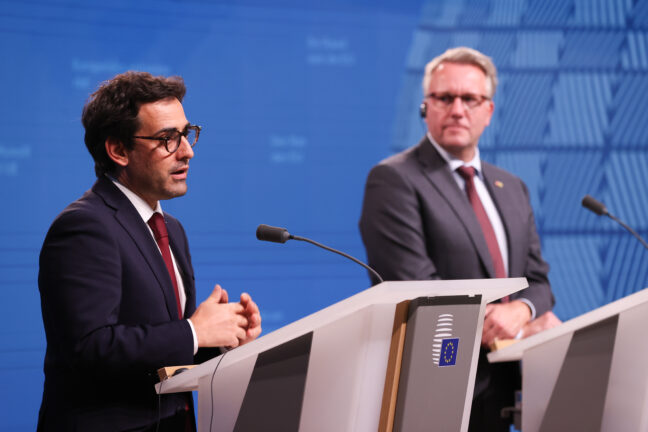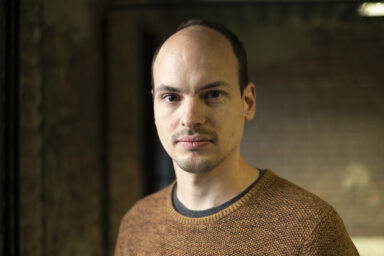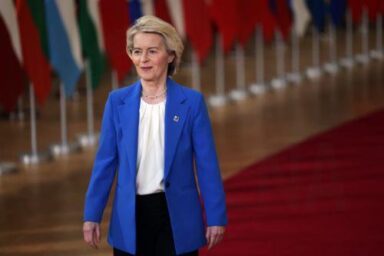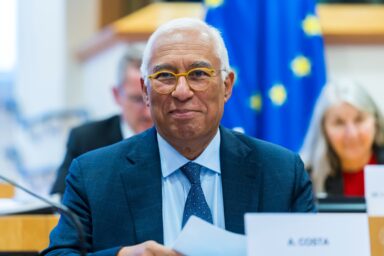Simplify, simplify, simplify! Ministers meeting in Copenhagen under the auspices of the Council of the EU gathered on Monday to address Europe’s declining competitiveness and the future of the Single Market, amid mounting global pressure and internal barriers that continue to hamper investment, productivity and growth.
Denmark’s Finance Minister Morten Bødskov addressed attendees at the press conference, saying that Europe was at a challenging and defining moment (not only with continuing Russian aggression in Ukraine) but with competition from China and the US ramping up. He made clear it was time to take necessary steps to ensure that the EU is not left behind.
“We need to step up or China and the US will set the pace,” he noted, stressing that productivity needed to grow at a much better rate. According to the minister, the problem the Commission and Council are tackling now is two-fold: on the one hand, “too much red tape” and on the other, “processes that drag on too long”.
Pressure cooker
Nevertheless, in his view, the meeting was productive and the EU will make progress. “A top priority for the Danish Presidency [of the Council] is simplification, and by simplification I do not mean deregulation (…) it is not about rolling back political ambition, it is about reaching our goals in a smarter and faster way.”
The minister cited Omnibus 1 as an example, paving the way for more investment, as well as positive collaboration with the EU Parliament. Above all, he mentioned that ministers had time to discuss the proposal on the Commission’s Competitiveness Fund, which he stressed was very ambitious. He emphasised unlocking investment in green solutions, tech and infrastructure. Likewise, he discussed the importance of reforming the Single Market (something EC President von der Leyen herself strongly emphasised in her recent State of the EU address). And he discussed the report by Enrico Letta, which was also a focus of the meeting.
You might be interested
“Today, former Prime Minister of Italy Enrico Letta was able to discuss his report to set the agenda and discussion about what we need to do (…) All too often in the single and internal market things are blocked by too many internal trade barriers and we agreed we need to continue the discussion… to make it easier to trade in Europe.”
Food for thought
In Much More Than a Market, Mr Letta advocates transforming the EU Single Market into a strategic instrument for resilience, sustainability, and competitiveness. EU Executive Vice-President Stéphane Séjourné summed up the Council in three points, with a special emphasis on the Competitiveness Fund.
“The Competitiveness Fund comprises €435bn for innovation in the Horizon Funds (…) Four hundred billion euros will have a true impact in the economy and will leverage the private sector and will have a true impact on the economy. That is expected.”
It is vital that we bring Europe up to speed. We have fallen behind now. Our productivity is too low. Our investments are too low. – Morten Bødskov, Danish finance minister
As second, the vice-president discussed the overriding aim of simplification and third, the Single Market and a proposal he would put to the Commission that includes emphasis on the telecom industry, financial markets, energy, which he called “indispensable”. Lastly, he emphasised an enforcement and harmonisation of rules to achieve or allow for significant growth and reinforce the internal market.
Maintaining a balance
A big concern is how the Commission will guarantee a geographic balance among member states vis-à-vis the Competitiveness Fund, as well what the so-called safeguard clause will entail. As of now, full details remain under wraps.
“There is a twofold willingness of a fair distribution among small and large companies,” Mr Séjourné replied, while stressing the equal importance of equal geographic distribution as well.
“To achieve these results, we need to improve transparency.” Transparency combined with a fair amount of the burden of getting out the word will rest with member states themselves. “As for the safeguard clause,” he continued, “I can tell you it will be the most restrictive clause (…) this safeguard will enable significant investments,” he stressed.
While not public yet, he said it would be presented to the Commission within days.
Time keeps on slipping
Finance Minister Morten Bødskov agreed and added his conviction the direction was the right one, with little time to waste.
“There is no doubt that we support the initiative on the Competitiveness Fund as explained by the Commissioner here. It is vital that we bring Europe up to speed. We have fallen behind now. Our productivity is too low. Our investments are too low. We need to activate more private risk-willing capital into new technologies, green technologies and green critical infrastructure just to mention three areas where we need an investment boost.”
And he stressed the main reasons why: “When we hear from companies, industry, business all over Europe that they need one entry, faster access, and lower permit times, we need to go for that.”
With discussions ongoing and more clarity expected in the weeks ahead, ministers agreed on the need to maintain momentum — before the gap with global competitors grows wider still.










